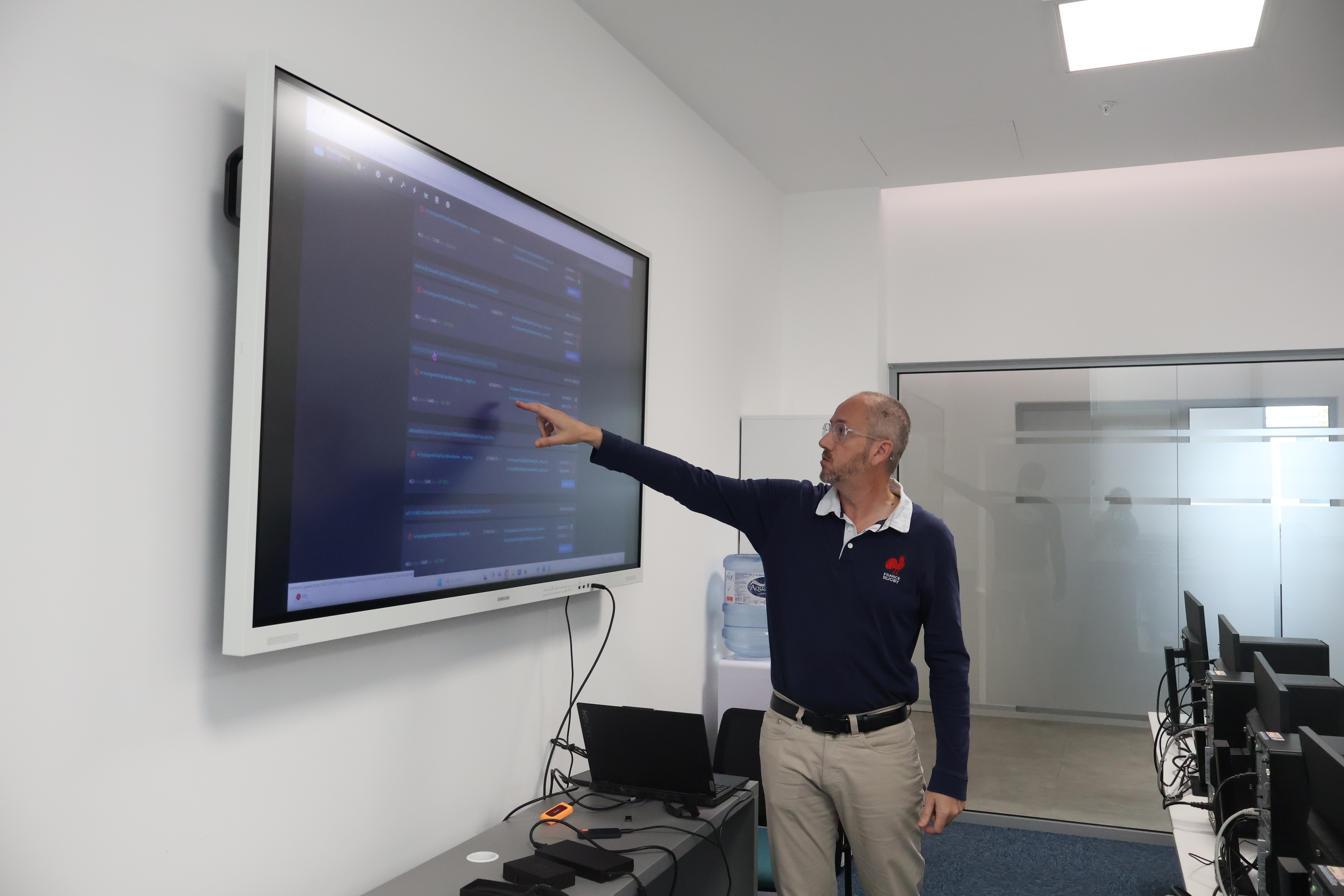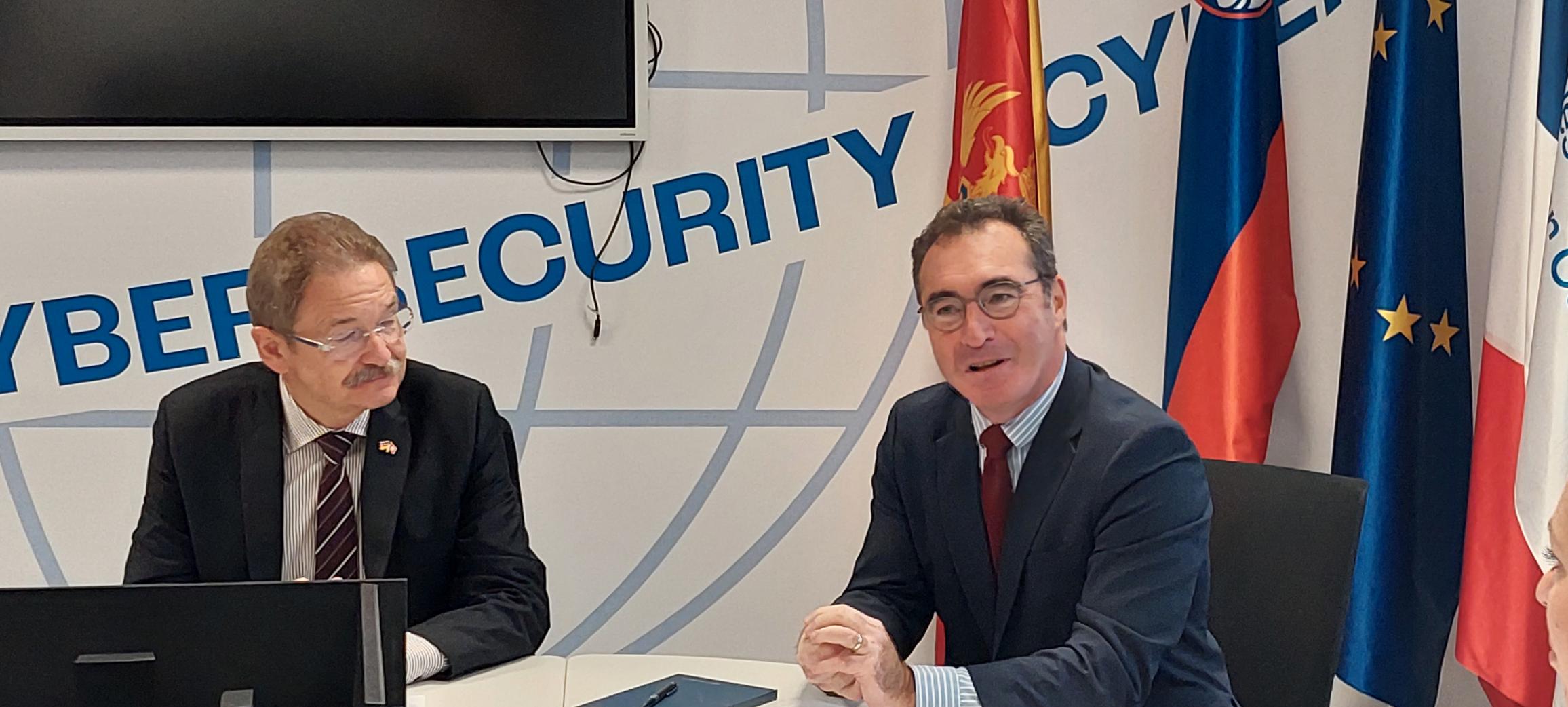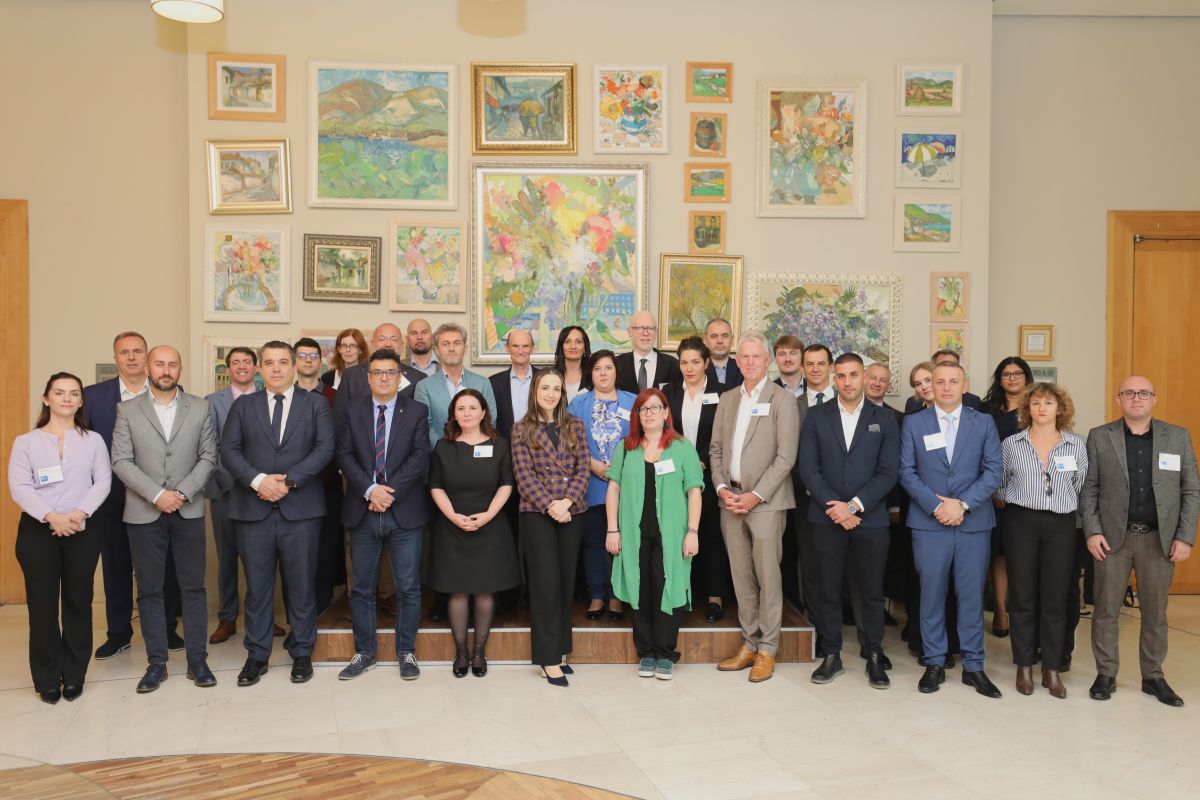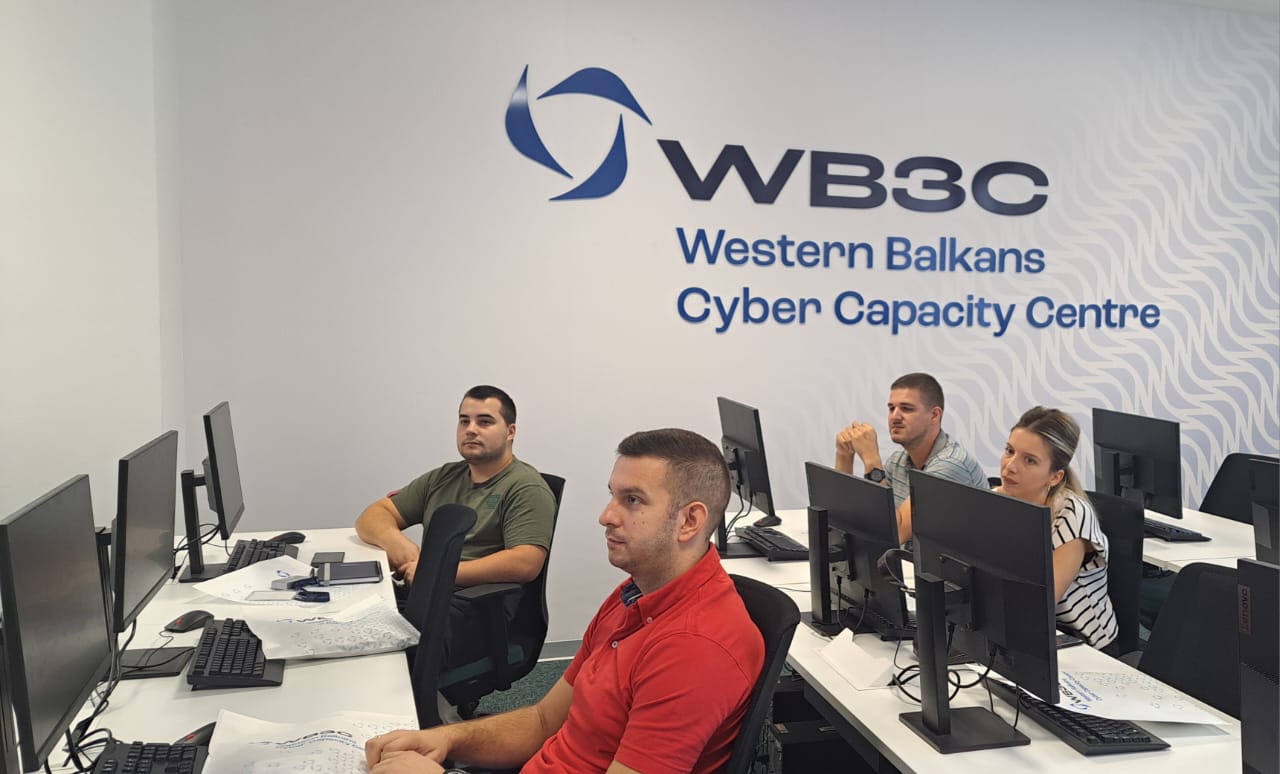22.10.2025
Regional Strategic Leadership Course (RSLC) Visit
On 22 October, we hosted a visit of the participants of the Regional Strategic Leadership Course (RSLC) at our premises. This annual meeting is held in Montenegro this year and implemented by the Ministry of Defence of Montenegro jointly with the Federal Ministry of Defence of Austria, bringing together 35 senior civilian and military leaders from Austria, North Macedonia, Bosnia and Herzegovina, Serbia and Montenegro.
To showcase WB3C’s mission and work, we organised a presentation and a tour of our facilities. Our Senior Project Manager, Vanja Madzgalj MBE, delivered the briefing and guided the delegation. We closed with a focused Q&A on regional cyber capacity priorities and the future functioning of the WB3C as an international organization, where our guests expressed their positive impressions about the idea behind the Centre and the scope of work already being done in a short period of time.
22.10.2025
Cooperation with Civipol on the Critical Infrastructure and Public Spaces Protection (CIPS)
This week, WB3C has the pleasure to participate in the Steering Committee Meeting of the European project "Strengthening the Protection of Public Spaces and Critical Infrastructure in the Western Balkans" (CIPS), held in Bar, Montenegro.
In the presence of DG ENEST, the Regional Security Assistant, Direction de la coopération internationale de sécurité (DCIS) and Civipol, Mr Gilles SCHWOERER, Head of WB3C, gave a presentation on our work with a view to future collaboration with CIPS on cybersecurity. Following the meeting in Bar, colleagues from Civipol visited our Centre in Podgorica.
21.10.2025
Building capacity for cryptocurrency investigations
This week, we are running a specialized training on cryptocurrency investigations at WB3C led by our in-house trainer Lieutenant Yannick Casse of the Gendarmerie Nationale.
The five-day program will strengthen the skills of cyber and financial investigators in tracing, analyzing and reporting cryptocurrency transactions using professional tools. Through practical exercises and certification, participants will gain a deeper understanding of how blockchain technology, Bitcoin and Ethereum operate, and how cryptography secures exchanges and transactions.
This training is designed to support law enforcement and cybersecurity professionals in addressing illicit activities involving cryptocurrencies and digital assets and we have 11 participants from all six administrations of the region attending the course. The advantage of this training is that it combines theory, tool-based practice and evaluation. Upon successful completion of the training, WB3C will provide each participant with a 1-year license to the professional software for tracing illicit crypto transactions. These professional investigation tools are essential for uncovering the complex financial trails that criminals attempt to hide behind blockchain anonymity. They allow investigators to visualize transaction flows, link wallet addresses to potential entities and detect patterns of money laundering, fraud or ransomware payments. By integrating such tools into everyday investigative practice, authorities across the Western Balkans can strengthen their operational response, build evidence-based cases and enhance regional cooperation in tackling cryptocurrency-enabled crime.
The mission of the WB3C is not only to provide technical training but also access to professional tools which bring cybersecurity and fight against cybercrime to a whole new level.
20.10.2025
Croatia and Western Balkan CERTs Peer Exchange
WB3C is hosting a three-day peer exchange from 20–22 October 2025, bringing together cybersecurity experts from across the region. The group was welcomed by H.E. Peter Felten, Ambassador of the Federal Republic of Germany to Montenegro and Gilles Schwoerer, Head of WB3C.
This exchange is supported by our partners DCAF - Geneva Centre for Security Sector Governance and Deutsche Gesellschaft für Internationale Zusammenarbeit (GIZ) GmbH, represented by Lazar Lunic and Sophia Klumpp. We’re especially pleased to welcome to Podgorica the CARNET - Croatian Academic and Research Network representatives Ivana Jelačić and Bruno Varga as guest speakers, sharing Croatia’s experience in strengthening national cybersecurity frameworks and readiness under the NIS2 Directive.
This three-day session focuses on practical cooperation — from information sharing and coordination mechanisms to awareness-raising and a cross-border tabletop exercise (TTX) simulating incident response in the Western Balkans. Collaborative learning like this strengthens our collective resilience and supports progress toward a safer digital future for the region.
17.10.2025
Global Cyber Policy Dialogue: Western Balkans
WB3C joined the Global Cyber Policy Dialogue: Western Balkans on 16–17 October in Tirana, hosted by Albania’s National Cyber Security Authority and the Netherlands MFA with ORF America and ASDO.
The meeting gathered 30+ regional stakeholders at the roundtable format to discuss various aspects of capacity building, cooperation and international norms.
Our project manager, Maja Miranovic, delivered a short presentation on WB3C capacity-building work, covering our current courses and our training pipeline for the coming year, including all three pillars. She emphasized the unique value of our regional platform as a neutral hub for technical training and cooperation which serves as a cyber wing of the Berlin Process.
Agenda highlights:
- emerging threats and whole-of-society defense;
- incident-response tabletop led by Albanian authorities;
- UN norms and cyber diplomacy; and a session on scalable capacity-building models.
11.10.2025
WB3C at Microsoft Cybersecurity Bootcamp in Valencia
A highly productive week in Valencia at the 5th Edition of the Valencia Cybersecurity Bootcamp, organized by Microsoft. It was a privilege for the Western Balkans Cyber Capacity Centre (WB3C) to participate in this esteemed gathering.
The bootcamp provided a platform for in-depth dialogue on pressing global cyber issues. The sessions - from AI and cybersecurity to incident response and international law in cyberspace - offered valuable insights into the current digital security landscape. Engaging with such a distinguished group of professionals, including diplomats, legal experts and technical leaders from organizations like FIRST, OAS and the UN, was immensely beneficial.
Our colleagues, Gilles Schwoerer, Head of WB3C, and Vanja Radović, Project Assistant, representing the Centre, joined by colleagues from the region Marija Matić of the Ministry of Interior, Republic of Srpska, Bosnia and Herzegovina and Lendita Haxhitasim, a diplomat from the Ministry of Foreign Affairs, Republic of Kosovo*, were pleased to engage with the global cybersecurity community and bring some interesting insights and best practices back to the Western Balkans.
As a young woman in cybersecurity, Vanja Radović noted: "As a newcomer to this field, the bootcamp was a fantastic opportunity for professional development and expanding my horizons. Learning from leading experts and connecting with peers from around the world was incredibly valuable for our work at the Centre and for me personally."
Thank you to Microsoft and all the organizers for a well-designed and effective event.
04.10.2025
WB3C joins the To Be Secure (2BS) Forum in Budva
WB3C joined the 15th 2BS Forum in Budva, 3–4 October, at Hotel Splendid. The focus: volatility, hybrid threats and practical cooperation for regional resilience. The Forum marked its jubilee with new formats, including StratCom Talks that put strategic communications and cognitive security on the main stage.
Our Head Gilles Schwoerer joined Ivan Stanković of Čikom in a panel on AI for capacity building and cybersecurity moderated by Snezana Nikcevic. We stressed outcome-based training, human-in-the-loop assurance and AI-assisted triage to lift SOC and CSIRT performance.
03.10.2025
Combating Migrant Smuggling - Training for Air and Border Police
Combating migrant smuggling requires cutting-edge skills and cross-border collaboration. That’s why the Western Balkans Cyber Capacity Centre (WB3C) expert team was on the ground, training seven officers from the Montenegrin Air and Border Police.
Together with OLTIM - Office for Combating Illicit Trafficking of Migrants (French investigative unit for tracking and dismantling migrant smuggling), we equipped them with foundation tools to tackle modern threats:
✅ Using OSINT & Dark Web research to track criminal networks;
✅ Uncovering the sale of fake documents and tracing illicit financial flows.
Proud to support our partners in building skills for a safer region. International cooperation and capacity building are key to combating cross-border crime and dismantling the criminal networks behind migrant smuggling.
02.10.2025
Western Balkans Digital Summit 2025
We were honoured to participate in the annual Western Balkans Digital Summit in Skopje, a core side-event of the Berlin Process that sets the stage for the upcoming Western Balkans Leaders' Summit. The event featured high-level dialogues with prominent voices, including the European Commission, Regional Cooperation Council (RCC), International Telecommunication Union (ITU), ministers responsible for digital transformation and cybersecurity from across the region, and leading European experts. These conversations reinforced the critical link between regional security and digital transformation.
This gathering was a powerful reminder that regional security and digital transformation go hand-in-hand. It's clear that cybersecurity is no longer a standalone technical issue, but the essential trust-builder that enables integration across digital services, critical sectors and ultimately, with the EU's single market.
We were proud to see our WB3C cybercrime trainer, Yannick Casse, take the stage on a panel dedicated to cybersecurity solutions. He presented the WB3C as the primary regional hub for building cyber capabilities and the essential platform for fostering cross-border cooperation, the key enabler for implementing regional cybersecurity policies and fight against cybercrime.
Beyond the panel, our colleagues Vanja Madzgalj MBE and Guillaume Narjollet used the opportunity to hold productive meetings with our key stakeholders and expand our network with new contacts, reinforcing the partnerships that are central to our mission.
The message in Skopje was clear: collaboration is our greatest asset. We return energized to continue our work across cybersecurity, cybercrime and cyberdiplomacy, looking with enthusiasm into our work plan for the next three months, which will bring some exciting activities with ransomware as the central theme.
 Visit/2q2k5ExHSbV9F6qo5yCJ5XqtVAqZlDdRjfh8W5cV.png)
/5JiNVmsFsVd7rRcSIJbRFC4QwnnEKhkTFGstb6Y9.jpg)




 Forum in Budva/p54wanNlZerS1B10krHqvf3v8sa6av7znyQm1hAW.jpg)




